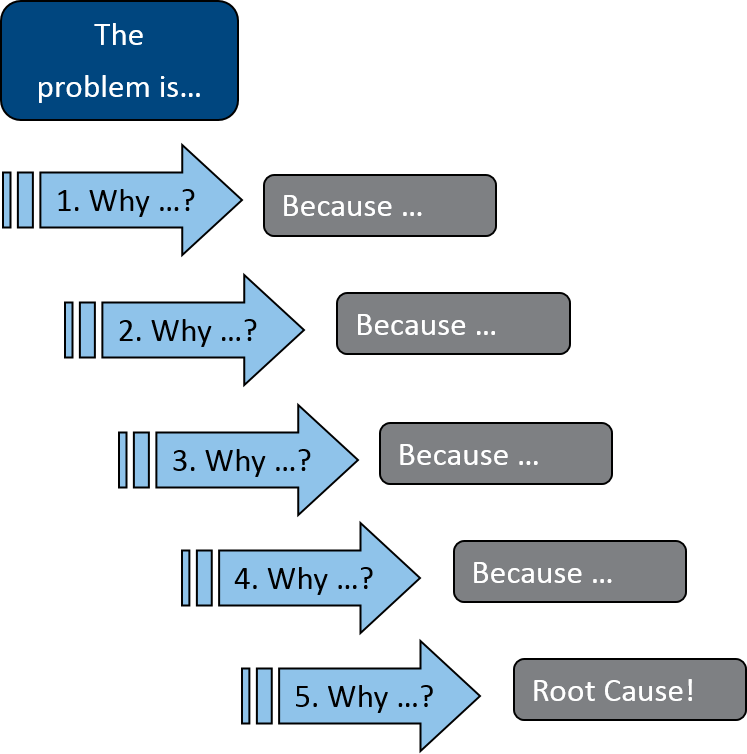A Beginners Introduction to RCA – Root Cause Analysis
Have you ever tried to write down all of the steps and decisions required to make a tea? I can assure you, there are several more than what you first write down. By applying RCA techniques, you are forced to look at all of the little steps and details in a process that could potentially cause a problem, and either rules them out, or define them as the Root Cause. You break the process down, and in turn, discover where there is potential for problems to arise.
If you had asked me two weeks ago ‘Do you know what RCA is?’ I probably would have said something generic – along the lines of ‘RCA is a way of finding out the cause of a problem.’ And simply put, that could be considered a good answer. But did I know how to apply RCA techniques to everyday life? Or why RCA is such a handy tool? – well, the answer to that is definitely not. However, this month I had the pleasure of attending an EMS Cognito RCA 2 day workshop, ran by our very own Matt Gilson, and alongside 4 candidates from Mazak.
Upon being presented with the opportunity to go, I found myself wondering whether this course could apply to me. Was I going to find the techniques useful? What will an Admin and Marketing Assistant be able to take from a course designed to assist people in the manufacturing industry? I never imagined I would find RCA techniques so useful, and applicable to all aspects of everyday life, even my own!
The 2 days were spent presenting problems within the group, and together applying RCA problem-solving techniques. We went through each stage of the Problem Solving Process:
Stage 1: Define the problem
Stage 2: Structured Investigation
Stage 3: Identify the ‘True Cause’
Stage 4: Develop Solutions and Take Action
So how did this help me? Well seeing as I don’t have any issues with factory based processes (I’m no Engineer) the problem I presented was: I am always running late in the morning! And whilst it was slightly embarrassing to discuss the methods I use to get ready in the morning, I found myself digging deeper and deeper into the actual cause of my lateness. I had 5 people, asking me questions about my early morning habits. We completed this exercise to first map out my early morning process, and structure our investigation. Questions ranged from:
- Do you take a long time to have breakfast? (yes, I can’t function without a proper breakfast and freshly brewed coffee)
- Are you easily distracted? (yes, I always find an excuse to do something that is completely unnecessary when I should be doing something else)
- What time do you go to bed? (I’m a self-confessed night owl – so always late!)
I was standing in front of the group, and we were Mind Mapping potential causes…my early morning activity scribbled all over an A0 sheet of paper. Using the 5 Why’s, the group forced me to take a good long look at my habits –

Why? Why? Why? Why? Why?
And what did we find? I have yet to accept that unfortunately like most of the female population, I take a lot longer to get ready than I like to admit. The root cause – my morning process involves too many steps that are completely unnecessary! If I eliminate these actions, which we can call ‘waste’, I have a much greater chance of being on time!
Female tendencies aside, the 2-day workshop proved to be an invaluable learning experience. I was introduced to problem-solving techniques I had never heard of; The Fishbone diagram, Process Mapping, Fault Tree Analysis – all of which offer different methods for finding the Root Cause. It was amazing to see how mapping out a process always seemed a lot simpler initially than it in fact was. It is so easy to skip over crucial elements in a process because when you repeat the process every day they become habitual – like making a tea!
The workshop has left me with an appreciation for Root Cause Analysis, and the necessity for its place in all aspects of life – whether that be in the office, in the production line, or even at home. Next time you make a tea, imagine someone is narrating every step and decision you make – I guarantee you’ll be surprised by how complicated the process can be!
Share:

